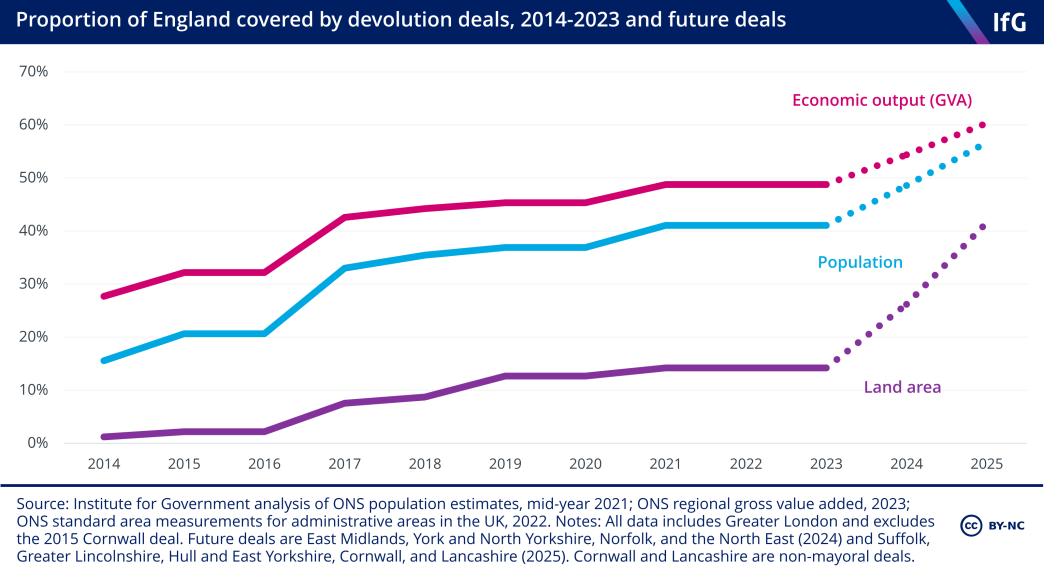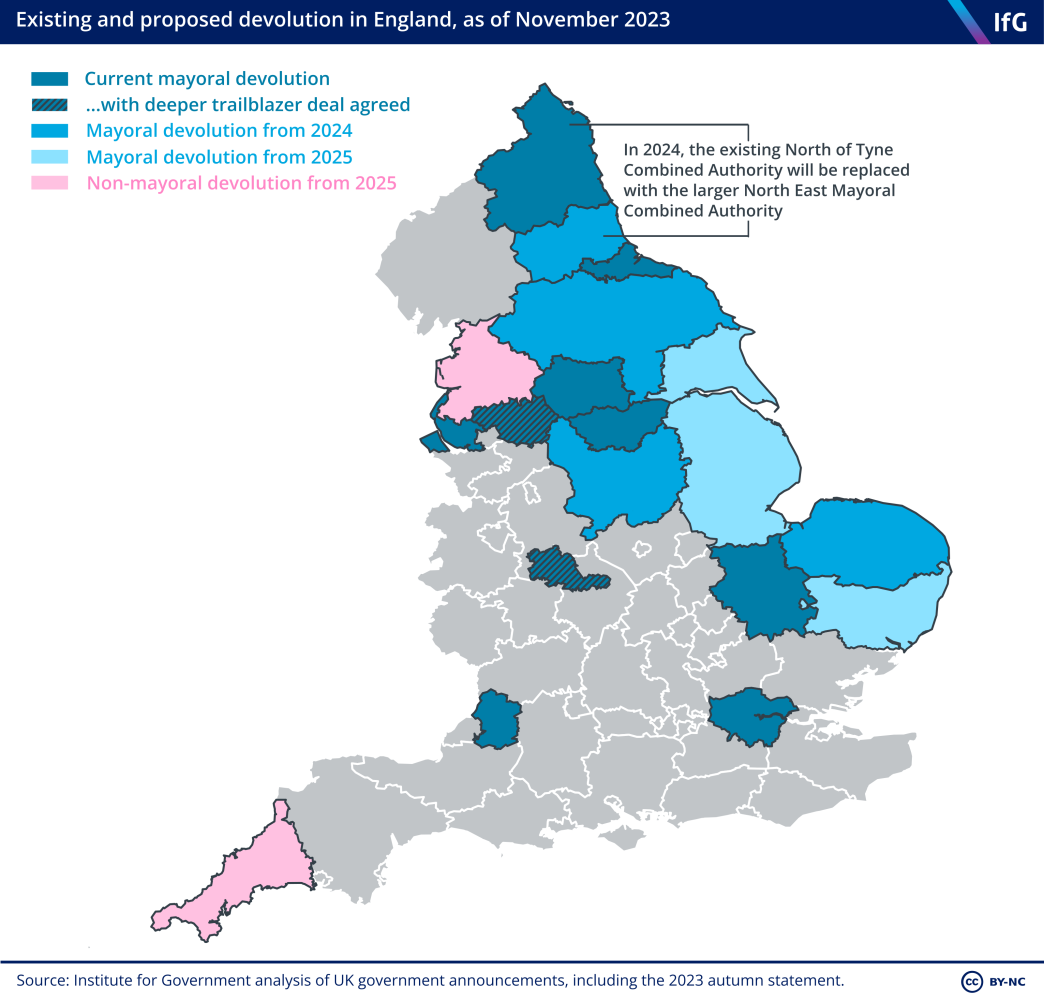The 2023 autumn statement marks a step forward on devolution – but the job is far from complete
Four new devolution deals shows promise for the government’s devolution agenda.

The chancellor’s announcements included welcome signs that the government remains committed to devolution in England. But the job is far from complete, says Akash Paun, and whichever party is in power after the next election will have to pay close attention to implementation of the new arrangements
In February 2022, the government’s Levelling Up white paper committed to a radical dispersal of power from Whitehall to local leaders across England. Devolution was rightly described as key to solving the problem of regional inequality. The white paper was followed by a year of activity, with eight new devolution deals announced, but the momentum then appeared to dissipate, as the Sunak government seemingly became preoccupied by a series of more pressing concerns.
But, in what is likely to be Jeremy Hunt’s last pre-election autumn statement, the chancellor unveiled an array of new measures that add up to a substantial further empowerment of local leaders, with devolution set to be both extended to new parts of England and deepened in many places where metro mayors are already in post.
The government is extending devolution to new areas – but some big gaps in the map remain
The chancellor announced four brand new devolution deals on Wednesday. These include new ‘level 3’ deals in Greater Lincolnshire and Hull and East Yorkshire – where new mayoral combined authorities will take on a package of transport, skills, housing and investment powers – and two less extensive non-mayoral ‘level 2’ deals in Lancashire and Cornwall.
These are to take effect in 2025, along with the pre-agreed Suffolk County Council deal. Combined with four deals due in May 2024, this will mean that 57% of England’s population, representing 60% of the national economy and 42% of its landmass, will be covered by devolution. This will represent substantial progress toward the government’s 2019 manifesto commitment of extending devolution across the whole of England by 2030.

But there is still some way to go. Big chunks of England, including rural Cumbria and Cheshire, and urban regions around Leicester, Southampton and Brighton, are still without deals. It is fair to say the government has picked the low-hanging fruit to date, and is now running out of places with a clear and obvious geography for devolution, or a high level of local support.
Keeping the momentum going – under this or a future government – will get progressively more difficult. It will require taking tough decisions about the geography of devolution in areas where local leaders cannot agree, as well as continuing strong commitment from the top of government to keep the process going.

The powers of mayors will be deepened – but commitment to devolution varies across Whitehall
Alongside the extension of devolution into pastures new, the autumn statement contained firm commitments to strengthen the powers of existing metro mayors. This allows places to move at different speeds, in line with the variable strength of local institutional capacity and commitment to devolution.
One important announcement that may not grab headlines was a document setting out how the new ‘trailblazer devolution deals’ for Greater Manchester and the West Midlands will operate. This memorandum of understanding sets out a new funding system for both areas in which they will gain much enhanced flexibility over transport, skills, housing, net zero and local growth budgets.
In addition, the government has promised to conclude new ‘level 4’ devolution deals 4 https://www.gov.uk/government/publications/technical-paper-on-level-4-devolution-framework/technical-paper-on-level-4-devolution-framework#chapter-1-… with existing authorities that meet readiness tests of their capacity, governance and culture. Those subject to investigation by the government due to concerns over their use of public money will also be excluded.
Although the government does not name and shame, the implication is that Liverpool City Region, West Yorkshire and South Yorkshire will be eligible for level 4 deals, while Cambridgeshire and Peterborough, the West of England and Tees Valley may be left out. The new deals do not go as far as the trailblazer deals but may serve as a stepping stone towards them.
Level 4 deals will expand devolved control of key drivers of economic productivity, including new powers over business support, careers and skills services, local transport and retrofit programmes. Perhaps the biggest prize is the promise of flexible ‘consolidated pot’ funding in two areas controlled by the department for levelling up (DLUHC): local growth and place; and housing and regeneration.
The fact that the most extensive offer comes from DLUHC, the department responsible for this agenda, suggests that other parts of Whitehall – such as the departments for transport, education, work and pensions – remain more sceptical about the benefits of devolution.
Announcing new deals is not the end of the process – implementation will be key
The chancellor has unveiled an impressive package of devolution plans. But as we highlighted in a recent report, the announcement of a new devolution deal is not the end of the process. Many deals have collapsed due to local opposition, including a mayoral deal for Cornwall that was abandoned earlier this year. The agreed deals for Suffolk and Norfolk also appear to have fragile local support.
Other deals have been rushed through implementation despite weak local commitment and institutional capacity. This has led to poorly performing authorities in places such as Cambridgeshire and the West of England, which the government is still trying to improve six years later.
Government must pay close attention to implementation, supporting places to get ready for the transfer of powers. With a general election looming, the risk is that political focus drifts, but this is the government’s last opportunity for a big push to devolve power. It is essential that it gets it right.
- Combined authorities
- Greater Manchester Combined Authority Cambridgeshire and Peterborough Combined Authority Liverpool City Region Combined Authority Tees Valley Combined Authority West Midlands Combined Authority
- Public figures
- Jeremy Hunt
- Publisher
- Institute for Government